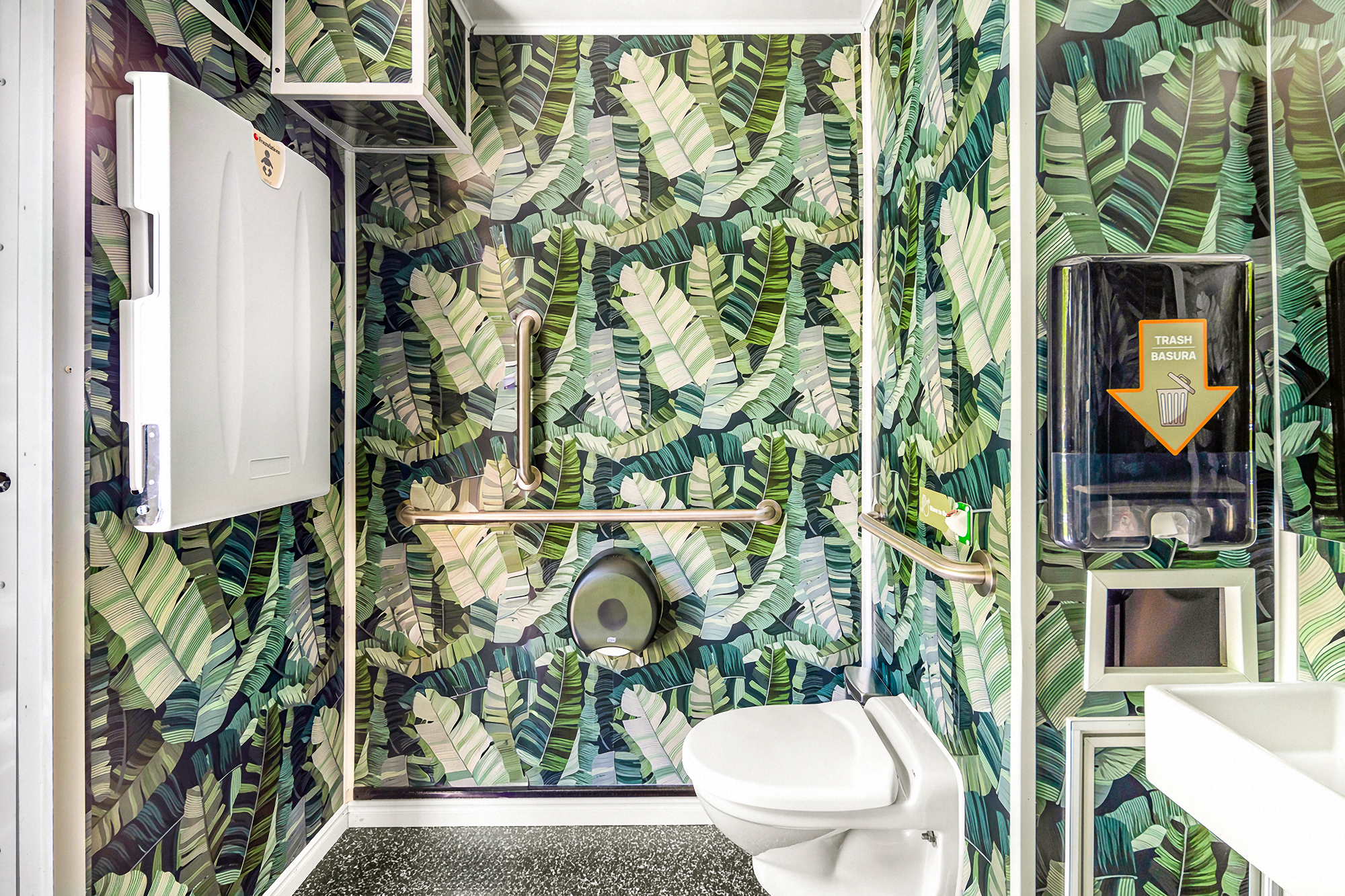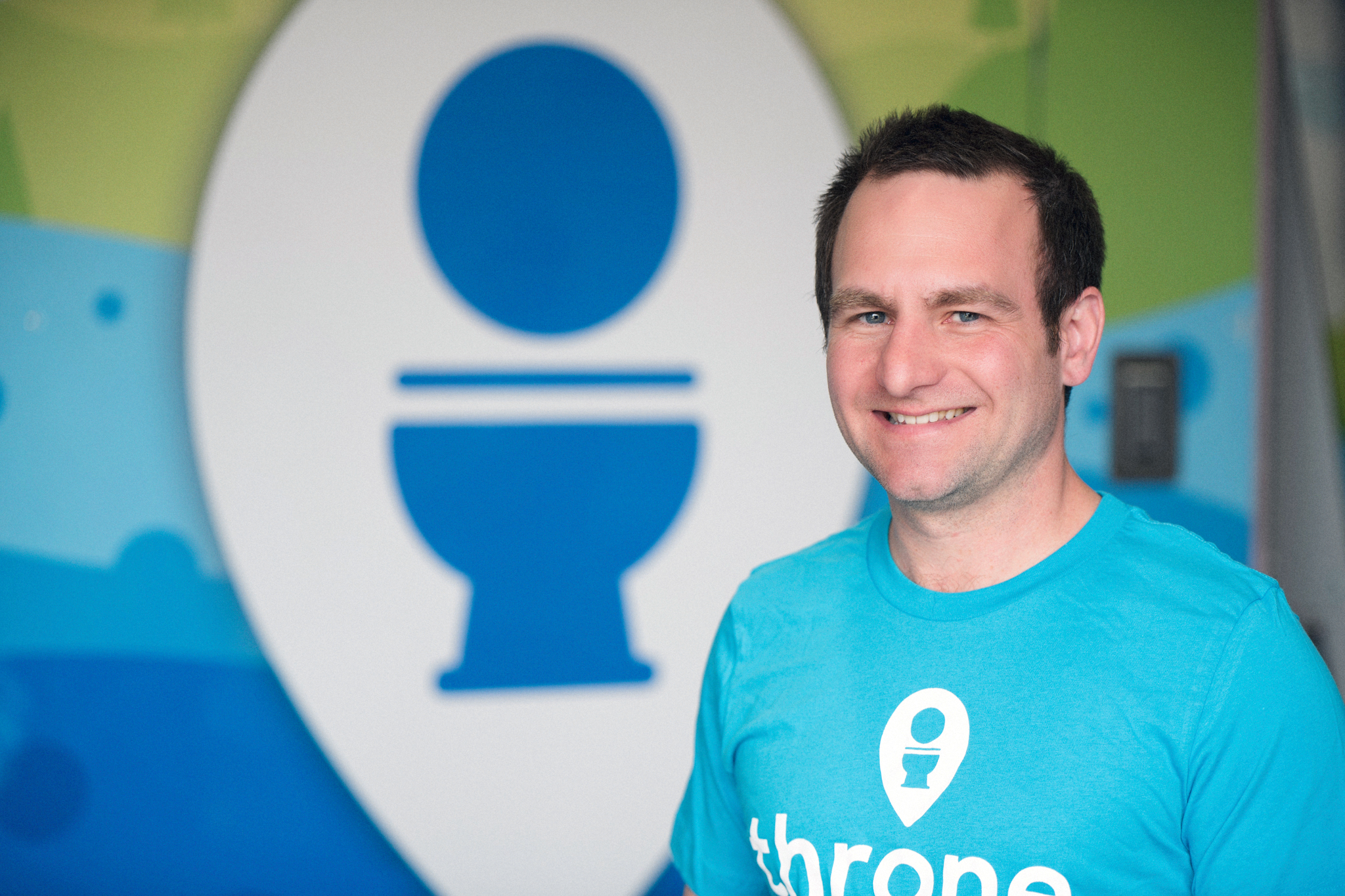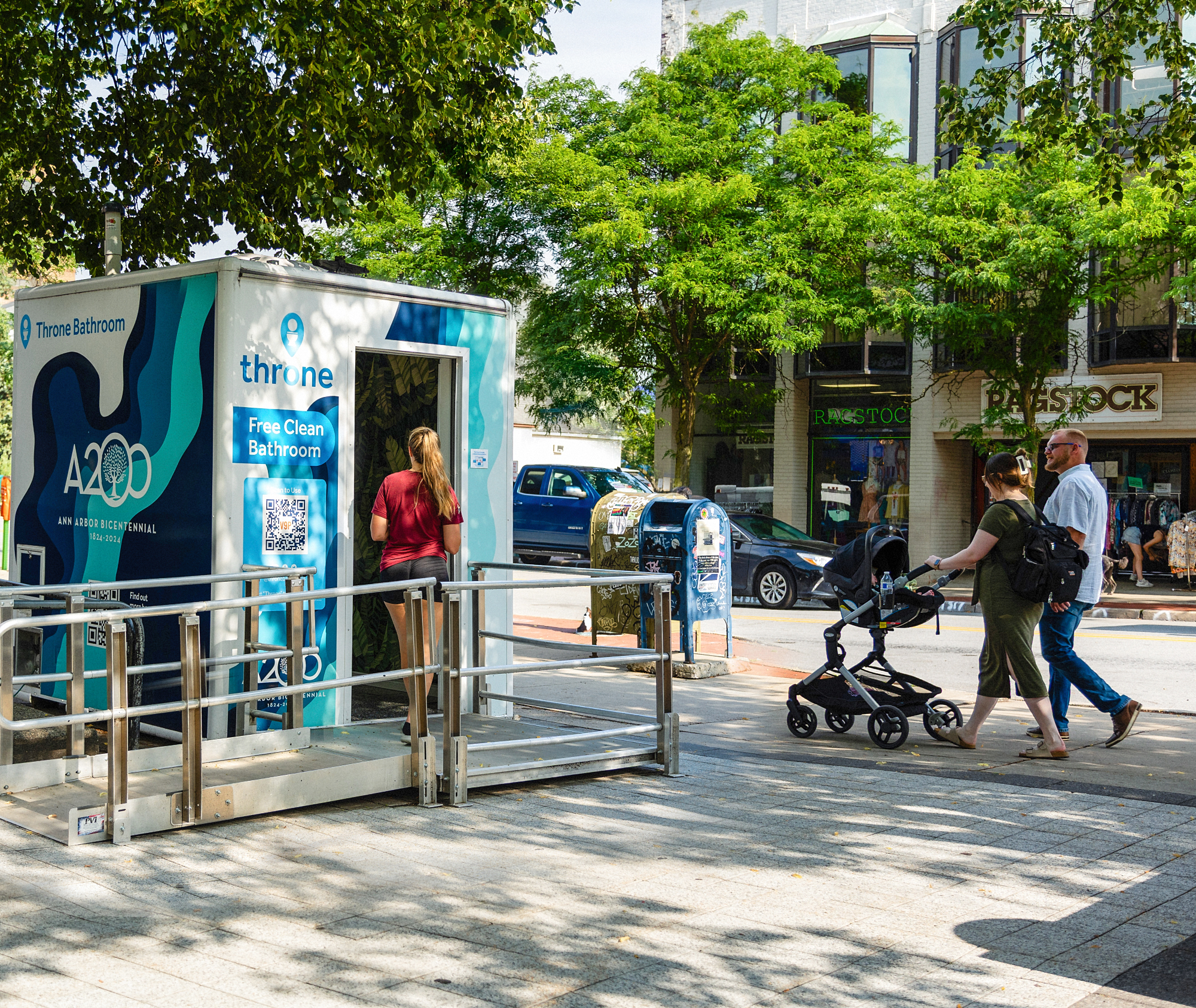Anyone who’s ever felt stress at the stall or panic in a park knows that public toilets—their presence or absence, their cleanliness—can stir strong feelings. Delight is not often one of them. But that is unmistakably the emotion that comes across when Derek Delacourt talks about the mobile toilets in Ann Arbor, Mich., the Midwestern college town where he oversees community services.
For more than a year, the city has been experimenting with a novel solution to the old problem of giving people someplace to go. As elsewhere, that burden mostly falls on businesses, cafés, restaurants, bars, and libraries—a patchwork system that leaves people at the whims of opening hours, company policies, and the ability to pay for a cup of coffee. Constructing permanent facilities, meanwhile, bogs down in debates about cost, location, maintenance, and policing.
So, in the summer of 2024, Ann Arbor partnered with Throne Labs, a start-up co-founded and led by Fletcher Wilson, MS ’08, an entrepreneur and engineer with a hardwired interest in creating a world with better facilities. “The line I always say is my GI system is my worst system,” Wilson says. The city deployed nine of Throne’s high-tech mobile toilets—8 feet by 9 feet, self-contained, typically solar-powered, ADA-compliant restrooms that feature running water, baby-changing tables, and frequent cleanings. Most users gain free entry by texting or scanning a QR code with their phones. Afterward, Throne Labs will prompt them to rate their experience. The average response in Ann Arbor has been 4.7 out of 5, Delacourt says, excellent for any service, let alone a public privy where so much can go wrong. “People often walk out saying things like, ‘That was the most pleasant public restroom experience I’ve had,’ ” Delacourt says.

Of course, clean, accessible public lavatories tend to be a topic we care passionately about in our hour of need and forget otherwise. Wilson, who previously founded a successful medical device company, occasionally gets asked why he would dedicate his talents to toilets. But Wilson knows as well as anyone how distressing America’s “bathroom deserts” can be. At Stanford, he was a Stanford Biodesign Innovation fellow, and he absorbed the program’s ethos that before you can come up with solutions, you have to delve into a problem. Before co-founding Throne in 2020, he interviewed everybody from police officers to homeless people to Lyft drivers, uncovering hacks from peeing in bottles to planning one’s day around pit stops to traveling with a clip-on tie—the better to slip into hotel lobbies. “I just realized this is one of those problems that permeate society really deeply.”
Indeed, by one recent count, the United States has just eight public toilets per 100,000 people, tied with Botswana and well behind leader Iceland’s 56, says Steven Soifer, co-founder of the American Restroom Association. He estimates that at least one-third of the population has bathroom needs—from accommodating medical conditions to parenting preschoolers who “didn’t need to go” before—that make this shortage especially difficult. “This country needs a toilet revolution,” he says.
Additional latrines aren’t much good if they’re disgusting or unsafe. Throne’s early vision was to create the equivalent of a hotel lobby restroom in a parking lot. To keep the stalls inviting, Throne Labs uses a range of tactics. Touchless flush, faucet, and soap dispenser minimize the ick factor. The climate-controlled interior is more comfy home bathroom than steely institutional facility. Leafy wallpaper not only creates a soothing vibe but makes a poor canvas for graffiti. To combat those who persist, Throne cleaners carry patterned stickers designed for immediate coverage. The toilets are cleaned by hand roughly every 12 uses and their tanks are pumped every 300. To discourage loitering, the toilet has a 10-minute limit.
“One of the clear insights we found is that a nice bathroom stays nice, a gross bathroom gets much worse.”
But Throne’s most powerful tool, Wilson says, is its digital thread with its users. The smartphone connection not only allows a user to rate Throne, but Throne to rate the user, à la Uber. If enough people report bad conditions after someone’s visits, that user can be banned. It rarely comes to that, Wilson says. But the possibility alone entices good behavior. “There is this kind of subtle situation where it’s like, ‘Maybe if I mess it up, the next person is going to rate it and I’ll look bad,’ ” Wilson says. “We definitely have done interviews and folks are feeling that is a motivator to just pick up the paper towel or not pee on the seat.”
And that feeds a virtuous circle wherein spick begets span. “We clean very frequently, but we don’t have to clean as frequently as you otherwise would,” Wilson says. “One of the clear insights we found is that a nice bathroom stays nice, a gross bathroom gets much worse.”
The company has more than 80 toilets in four geographic locations: greater Detroit, the Bay Area, Los Angeles, and Washington, D.C. After the D.C. Thrones were removed due to budget challenges, an online petition quickly drew more than 1,000 signatures urging the city to restore service. The LA Metro system started with four Thrones and is on its way to 64 in time for the 2028 Summer Olympics. The powder rooms have been a hit with families and senior citizens; they’ve reduced instances of public urination; and they’ve been embraced and cared for at some of the stations previously most prone to vandalism. “It absolutely smashed a home run from our point of view,” says Stephen Tu, deputy executive officer for the transportation agency.
 COMFORT ZONE: Wilson.
COMFORT ZONE: Wilson.
Annual tallies, including equipment and service, range from $55,000 to $100,000 per unit depending on usage, says Wilson. That compares favorably with more permanent options. San Francisco made headlines in 2022 for a single-commode, cinder-block restroom that was initially penciled in at $1.7 million in building costs alone. And New York recently installed five Portland Loo outhouses—capsule-shaped stainless-steel single-occupancy facilities—at a reported cost of $1 million each, not including maintenance. By contrast, an ADA-compliant porta-potty can be rented for about $350 a month, depending on location and frequency of service. But as anyone who has taken a deep breath before entering one of those plastic boxes can attest, that is a different experience altogether.
Throne attracts criticism from some quarters that its model excludes those without phones, notably homeless people. In Ann Arbor, the city passes out reusable access cards that provide an alternative method of entry.
That’s what Shanekia Melton uses if her phone isn’t charged. She often sleeps at Liberty Plaza, a small park in downtown Ann Arbor. Before Throne, the park had traditional porta-potties that Melton, who has been homeless for two years, characterizes as disgusting. “You couldn’t even wash your hands.” She’s only seen the Throne in poor condition once, and a cleaner was on-scene five minutes after she texted a notification. Cool in summer, warm in winter, and clean almost all the time, “Throne is where it’s at,” Melton says. That’s the kind of response that redoubles Wilson’s commitment to giving people the dignity of a good toilet. “Helping someone avoid anxiety, solve a problem, or prevent a disaster—that’s meaningful,” he says. “For someone who doesn’t have access to a clean bathroom, having one is totally life-changing, not just a slight improvement to their day.”
Sam Scott is a senior writer at Stanford. Email him at sscott3@stanford.edu.



